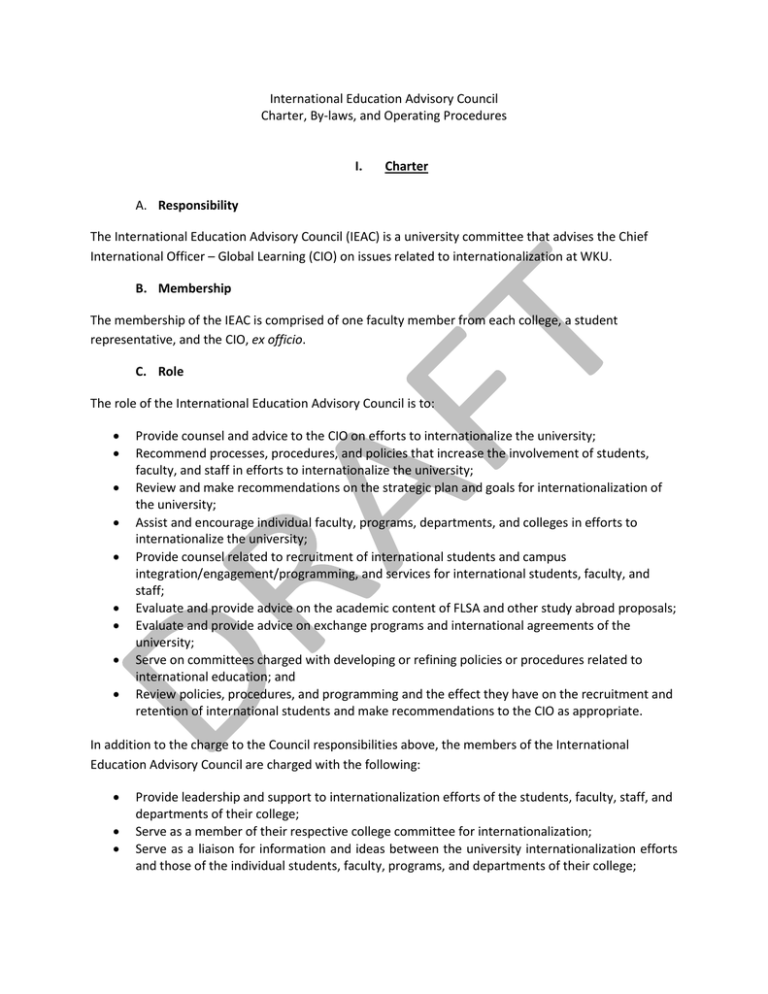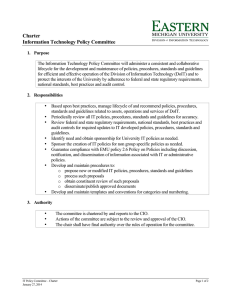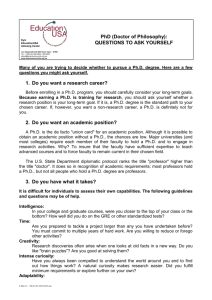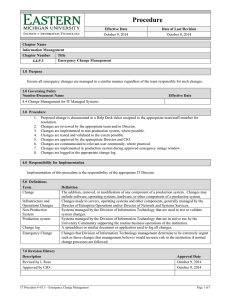International Education Advisory Council Charter, By-laws, and Operating Procedures Responsibility
advertisement

International Education Advisory Council Charter, By-laws, and Operating Procedures I. Charter A. Responsibility The International Education Advisory Council (IEAC) is a university committee that advises the Chief International Officer – Global Learning (CIO) on issues related to internationalization at WKU. B. Membership The membership of the IEAC is comprised of one faculty member from each college, a student representative, and the CIO, ex officio. C. Role The role of the International Education Advisory Council is to: Provide counsel and advice to the CIO on efforts to internationalize the university; Recommend processes, procedures, and policies that increase the involvement of students, faculty, and staff in efforts to internationalize the university; Review and make recommendations on the strategic plan and goals for internationalization of the university; Assist and encourage individual faculty, programs, departments, and colleges in efforts to internationalize the university; Provide counsel related to recruitment of international students and campus integration/engagement/programming, and services for international students, faculty, and staff; Evaluate and provide advice on the academic content of FLSA and other study abroad proposals; Evaluate and provide advice on exchange programs and international agreements of the university; Serve on committees charged with developing or refining policies or procedures related to international education; and Review policies, procedures, and programming and the effect they have on the recruitment and retention of international students and make recommendations to the CIO as appropriate. In addition to the charge to the Council responsibilities above, the members of the International Education Advisory Council are charged with the following: Provide leadership and support to internationalization efforts of the students, faculty, staff, and departments of their college; Serve as a member of their respective college committee for internationalization; Serve as a liaison for information and ideas between the university internationalization efforts and those of the individual students, faculty, programs, and departments of their college; Work with departments within their respected college to assist in welcoming exchange students, place them in appropriate courses, and help acclimatize them to the WKU community; Assist in advertising Global Studies Designation opportunities within their college; Assist in assessing college offerings for inclusion in the Global Studies course list. Participate, at the expense of the Office of International Programs, in professional development opportunities that facilitate their role on the IEAC; Help in the development and assessment of international learning objectives, skill sets, and goals for the programs, departments and colleges; Assist faculty and staff of their college in the development of study abroad programs and international faculty development projects; Provide evaluation to their respective dean on internationalization efforts for the college; Help link international QEP goals to their college; Encourage faculty and staff development in international teaching, research, and service; and Work closely with other IEAC members to help foster an atmosphere of cooperation among all units of the university. Identify policy changes that will improve WKU’s international efforts and recommend such changes to the CIO, who can work with both the IEAC and the other administrators to find solutions. II. By-laws and Operating Procedures A. Membership The voting membership of the International Education Advisory Council is composed of one faculty representative from each of the academic colleges and one student member. 1. Faculty Representatives i. Eligibility and Term Faculty representatives must hold a full-time tenure-eligible appointment at WKU. Faculty members serve a three-year term, with approximately one-third the appointments expiring each year. Faculty members may be reappointed. The rotation for the faculty appointments, along with the initial year of appointment for the rotation, is as follows: 2013-2014 Academic Year: Potter College of Arts and Letters, University College 2014-2015 Academic Year: Gordon Ford College of Business, College of Health and Human Services 2015-2016 Academic Year: College of Education and Behavioral Sciences, Ogden College of Science and Engineering ii. Appointment The faculty members are appointed by the Provost, based upon the recommendation of the Dean of that college. The CIO will notify the appropriate deans in April of a term expiring at the end of the academic year. Each dean will confer with the CIO on potential candidates. iii. Resignation If a faculty member wishes to resign from the International Education Advisory Council, s/he will notify the Provost, the CIO and their Dean of the resignation. The CIO and the Dean will follow the appointment process outlined above to fill the expired term. 2. Student Representative The student member of the International Education Advisory Council will serve as a liaison between the council and the student body, and will consult with the Student Government Association and the student members of the Graduate Council regarding the work of the International Education Advisory Council. i. Eligibility and Term The President appoints the student member, for a one-year term from September 1 through August 31. ii. Appointment The CIO will consult the President of the Student Government Association in August and request nominations for the student member. The CIO and the Student Government Association President will discuss the potential nominees, and will forward names to the university President who will make the appointment. iii. Resignation If the student member wishes to resign from the International Education Advisory Council, s/he will notify the CIO and the President of the resignation. The CIO and the President will follow the appointment process outlined above to fill the expired term. 3. Chair and Vice-Chair i. Eligibility and Term The initial appointment of the Chair, for a one-year term expiring June 30, is made by the President. Thereafter, each year the members of the council will elect a vice-chair, with an appointment effective July 1 and running through June 30. The vice-chair will succeed the chair. ii. Resignation If the Chair resigns, the Vice-Chair will immediately fill the Chair position and the IEAC will elect a new Vice-Chair to fill the expired term. If the Vice-Chair resigns, the IEAC will elect a new Vice-Chair to fill the expired term. iii. Responsibilities of the Chair and Vice-Chair The responsibilities of the Chair will include: Presiding over the meetings of the IEAC. Preparing, in consultation with the CIO, the agenda and circulating it prior to each meeting. Creating ad hoc committees to address specific issues and appointing members thereto. Communicating with OIP staff, as necessary. The responsibilities of the Vice-Chair will include: Presiding over IEAC meetings in the absence of the Chair. Taking notes at each meeting and posting them afterwards. Assuming other duties as the request of the Chair. B. Committees The IEAC may create both standing and ad hoc committees as they see necessary. Standing Committees are created through Amendment of the Bylaws. Ad hoc Committees may be created by simple majority of the voting members present at a meeting at which a quorum is present. C. Meetings and Agenda 1. Frequency The IEAC will meet monthly, August through May. The CIO may call special meetings at his/her discretion or upon recommendation of the IEAC Chair. 2. Agenda Agenda items for the IEAC can come from at-large members of the university community through the Chair, from IEAC members, or from the CIO. Except for special meetings, the agenda must be made available to the members at least seven days in advance of the meeting. 3. Summer Exigencies During the summer, when the faculty members are less accessible, the CIO may, under extraordinary circumstances, with the concurrence of the Chair, take action. The CIO will inform the IEAC of any such actions. D. Amendments to Bylaws Proposed amendments to the Bylaws of the IEAC may be made by any member and must be made available to the membership at least fourteen days prior to a vote. Adoption of a proposed amendment requires a two-thirds majority vote of the membership. Recommended by the International Education Advisory Council: __________ Endorsed by the Chief International Officer: __________ Approved by Provost and Vice President for Academic Affairs: __________



